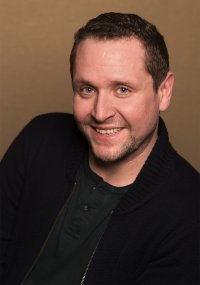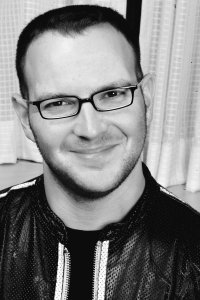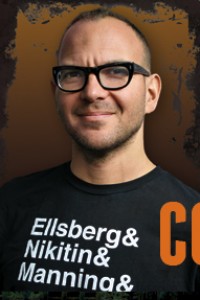Christopher Barzak: Visions & Voices
 Christopher Michael Barzak was born July 21, 1975 in Warren OH, and grew up in Kinsman OH. He attended Youngstown State University, graduating summa cum laude with a BA in English and a minor in Psychology in 1998, the same year he attended the Clarion writing workshop. He lived in Carlsbad CA for a year after graduation, then worked as a clerk at a bookstore and library in Lansing MI for two years. He moved back to Youngstown in 2001 for an MA in English and Creative Writing. In 2004 he moved to Japan, where he spent two years teaching English in elementary and junior high schools. He returned to Youngstown in 2006, where he now writes and teaches fiction writing at YSU and in the Northeast Ohio MFA program.
Christopher Michael Barzak was born July 21, 1975 in Warren OH, and grew up in Kinsman OH. He attended Youngstown State University, graduating summa cum laude with a BA in English and a minor in Psychology in 1998, the same year he attended the Clarion writing workshop. He lived in Carlsbad CA for a year after graduation, then worked as a clerk at a bookstore and library in Lansing MI for two years. He moved back to Youngstown in 2001 for an MA in English and Creative Writing. In 2004 he moved to Japan, where he spent two years teaching English in elementary and junior high schools. He returned to Youngstown in 2006, where he now writes and teaches fiction writing at YSU and in the Northeast Ohio MFA program.
He began publishing with ‘‘A Mad Tea Party’’ in Lady Churchill’s Rosebud Wristlet (1999). ‘‘The Other Angelas’’ (2004) was on the Tiptree Award longlist, ‘‘The Language of Moths’’ (2005) was a Nebula finalist and winner of a Gaylactic Spectrum Award, and ‘‘Map of Seventeen’’ (2010) and ‘‘Paranormal Romance’’ (2013) were Nebula Award finalists. Some of his short fiction was collected in Birds and Birthdays (2012) and Before and Afterlives (2013), the latter a Shirley Jackson Award winner.
His story ‘‘Dead Boy Found’’ (2003) was the basis for first novel One for Sorrow (2007), winner of the Crawford Award for best first fantasy. The book was adapted as film Jamie Marks Is Dead in 2014. Second book The Love We Share Without Knowing (2008), a mosaic novel inspired by his experiences in Japan, was a Nebula Award finalist, and on the Tiptree honor list. His first YA novel, Wonders of the Invisible World, is forthcoming this fall.
Barzak lives in Youngstown OH with his partner Tony Romandetti.
Excerpts from the interview:
‘‘The new book is called Wonders of the Invisible World. It’s about a 17-year-old in rural Ohio. He discovers that there’s a whole lot about himself and his family’s history that he didn’t know, and that his history and parts of his memories have been obscured by magical means. He discovers this when a new student approaches him in a hallway at school his senior year and remembers him from their childhood, and says they were best friends. This person seems to know things about him that he doesn’t recall. Very quickly after that, the spell that he’s been under starts to unravel. He begins putting together pieces of his life that come to him in visions, and discovers there’s an entire invisible world he belongs to. It’s a metaphor, in some ways, for the experience that young people go through, where you kind of awaken and realize there’s a much bigger world that you’re a part of, larger than the small world you’ve been operating in. It happens as you reach the end of adolescence and your time in the high school prison system. You face the question, ‘Who am I after this?’ I wanted to rephrase that question, which is often asked in young-adult fiction, and instead ask, ‘Who am I, in the context of the past I might not know about?’ Both in terms of personal, family history, and the cultural, national past. You are already part of something you don’t understand and never knew existed.”
…
‘‘Transformation is something that obsesses me. What is the soul? Is there a difference between something like a soul and something like a self? Is our identity something we construct, or is it organic and natural? There are all kinds of theories. It’s interested me from a young age. I remember being a very small child and climbing up to look at myself in the mirror – I had to be four or five because I remember the struggle of climbing up onto the bathroom vanity – and looking at myself and asking, ‘Who are you?’ I look back and think, ‘You are such a strange little boy.’ It was a moment when I tried to make sense of my existence in the world. I’ve always found being alive a really strange situation. I’ve always questioned it. I’m always asking: ‘Who are you?’
‘‘Our vision is limited by the fact of our biology, and we know that on a scientific level. We create technology in order to see things we can’t perceive on our own, in other spectra. That fact leads to the idea that there are things we’ll never be able to observe, at least not with the tools we have now. My hope is that there’s more to the world than we can see. I enjoy this world, and I’m grateful for it, but I hope it’s one stop in a much bigger universe. That’s wishful thinking. I always say I hope – I don’t believe there’s anything beyond this world. I don’t like to believe anything at all, because beliefs are just a feeling about something. We all have beliefs, and not just about spirituality. We have political beliefs, too. It’s an opinion, an idea, and they change. Beliefs change as well, so I don’t like to hold them close to me. I entertain ideas, but I don’t subscribe to anything. I was raised in this odd mix of philosophies, where my father’s side of the family was very grounded, all common sense and hitched to observable reality. They weren’t much for philosophical or spiritual thinking. It was more about doing what you’ve got to do to get by. My mother’s side was made up of more magical thinkers – her and her mother really did have this kind of magical system. They interpreted dreams, and it was their own dream system, nothing you could find in a book. I think it was a superstition my grandmother learned. Her parents were Polish immigrants. She grew up with old Eastern European ideas and beliefs. I’ve tried to track down some of her ideas, and they really feel invented, and not any part of a system I can locate. A very private family mythology. That worldview influenced One for Sorrow, but I expanded on it in Wonders of the Invisible World.”
…
‘‘I really do feel like I was born to write and tell stories. From a very early age I felt, ‘This is too rich, there’s too much good stuff going on here.’ My grandmother told ghost stories – stories that weren’t just invented, they were things that she saw, and she had these elaborate tales. I’m a slow-waker, and I’ve sometimes wondered if that’s a genetic predisposition and if it’s something that my mom or her mother did. Did they experience liminal dreamlike states, and this is how they made sense of it? Interpreting things they saw when they were technically awake but their brain was two steps behind, or ahead? I definitely had nightmares. I had a period when I would sleepwalk. Sometimes I still do. My parents would find me in different places, like the basement. One time they found me outside. Luckily, we were in the country; I didn’t walk out into traffic or anything. I was in the backyard, which is next to a cornfield, just at the edge of it, standing and looking into the corn. This is our reality, and it’s as strange as that. That magical tradition is on my mom’s side, not so much on my dad’s. I was glad that I had both. Maybe that’s why I like magical realist fiction, because there’s this push and pull. I feel fortunate that I was exposed to both modes, and there are other modes, too. I was fortunate to realize from a young age that the things my mother and her mother experienced and believed were not common. I realized the stories our larger society and culture have accepted are just stories, too. I was really aware of that, and I think it was because of the personal, private beliefs and superstitions that my mom and her mom had. These are stories that other people would think are strange, and not necessarily true. What’s to say these other stories that large numbers of people believe are any more true? I felt good about that. It made me question everything from a young age.”
…
‘‘One for Sorrow was published in August of 2007. In spring of 2008, my then-agent e-mailed to tell me there was a director interested in my book. He told me his name, Carter Smith. … ‘‘We probably talked off and on for a couple of years. In the spring of 2012 it seemed Carter had a group of people, a production company was forming, and they were casting and location scouting. In December of 2012 they were ready to buy the rights completely. Three or four months later they were filming. My partner Tony and I went to do a set visit one weekend during spring break, so I got to see some of the scenes being made. I also got to see some stuff being filmed that didn’t make it into the final cut. It was fantastic seeing things from my imagination being visually constructed, to step into my character’s house and see him and the ghost of Jamie Marks sitting together on a bed, saying words I’d written. Talk about liminal states. It was very magical.”
…
‘‘I have just completed a first draft of another novel called A Manual for the Most Effective Usage of Fallen Stars. I’m going to have to find a shorter title eventually. That’s a young-adult book. I’m still sitting on it, and it’s a first draft. I usually take them through a number of drafts. I always write whatever I want to write and hope that somebody will want to buy it. My editor at Knopf is eager to see the new book and she loves the title. Eventually when I feel confident, I’m going to look at it again and see what else I can do with it, and hopefully she’ll like it. I also have one more story to write for this collection of retellings and adaptations based on classic genre and children’s literature. I started writing stories in that vein a few years ago. The first one I wrote is ‘Invisible Men’, which was a finalist for the Million Writers Award, and was originally published in Jonathan Strahan’s Eclipse Online, and reprinted in Gardner Dozois’s Year’s Best Science Fiction. It was meant to be a fun experiment for me, because I’d read H.G. Wells’s The Invisible Man. I was put off by the description of the rural villagers in the book. Wells made fun of them in a lot of ways, unnecessarily. He clearly looked down on them. I felt badly about that; I’m from a rural background myself. So I started to write that story in the voice of a young girl who works as a maid in the inn where the invisible man stays for four months, trying to cure himself. I wanted to give her a voice. The story’s about that – who’s truly invisible in that book? I got really great responses to that story and I was invigorated by it, because I’d never done anything so consciously working with someone else’s material. I wanted to investigate other books that I loved. Sometimes there are wrongs I want to right, and sometimes I think there’s something the author might have had a hard time talking about in the period they were writing in. I have one more to write before the book is done. Then that collection will be finished, ten stories in all. I’ll give that to Barry, too, and hope for the best. I do everything on a wing and a prayer. Hopefully there will be a publisher interested in it.’’







